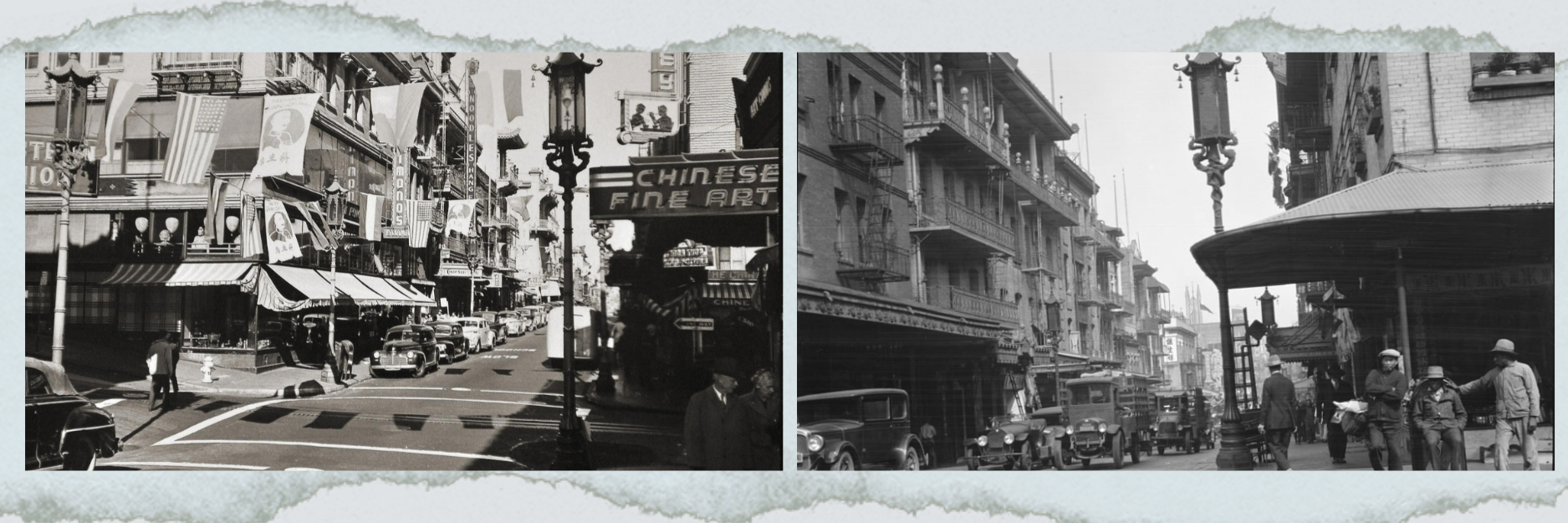James Poy Wong 黃培正

"They consider the alleys of Chinatown full of garbage piles a mighty insult, and they don’t want to live with rats and eat with flies. They will not sacrifice their enjoyment and health to satisfy foreigners’ curiosity or to provide filming scenes for Hollywood."
"The Problem of Modernizing Chinatown" - 1948
华埠现代化的问题
一位华埠的导游员最近向我说:“如果华埠的商店还不停止现代化下去,不出两年内,华埠就无法招引外来的游客了,外人要是想看洋化的建筑物也无需来华埠看。” 他从自己的经验中,知道今年的游客比以前的数目少,而游客们许多都已惋惜华埠今非昔比。
我问他有没有统计的数目字,他无法指出,他却认为都板街十间舖子中有六七间是靠游客维持的。 他并且相信华埠的繁荣已趋没落。
这位朋友或者过度悲观。 华埠的繁荣当然还有其他许多因素,但是他的观点确实具有值得我们彻底研究的问题。 这问题对于某些敏感和直接受影响的人们是严重的,为了将来,也是为了目前,我们应该加以考虑,免至将来自己吃亏。
在华埠的表面迅速地换新的时候,人们大多为之鼓舞和兴奋,却忘了计较利害。 有些人确已呼出警报,然而没有接着的一致行动,结果不免声隐事末。
有一部分人极端反对守旧。 他们以科学和卫生来争辩,主张把整个华埠的 “过时” 楼宇拉倒下来,重建现代化的建筑物。 他们认为华埠满堆垃圾的陋巷是一种绝大的耻辱。 他们不愿意和老鼠同居,和苍蝇共食。他们不能为了满足外人的好奇心和荷里活的取景而牺牲了自己的享受和健康。
华埠是一个特殊的地方, 所以有着特殊的利益。我们不想轻易放弃了这种利益,因为这利益会帮助我们建设和改善一个优良的社会,但是同时一个健全的社会, 绝不能单靠这点特殊的利益来维持。 华埠在三凡市里是一个独立的社会,它有生产,也有消耗,它有自己的文化,也有自己的营业。 它不独供养着一个迅速增大的人羣,同时也向外间伸出吸收的树根,所以它不能够孤立。
我们还不知道华埠的繁荣有多少成分是来自外间的吸收。 我们也不知道外间的来源是否会永远继续下去。 如果真的能够不断绝,那么它的数目在将来对一个增大了四五倍的社会又还有没有影响的力量。 换一句来说,我们靠它不靠它吃饭。
我们现在的繁荣是复杂的。 我深信做成一部份假繁荣的不正当营业,渐渐地会给时光淘汰,至多也是剩得一个残形,不会再影响社会的整体。 所以我们建设一个社会的时候,不应该只想到自己这代。 华埠的现代化并不是一种奢侈的现象,也不一定有害于社会的经济。 现代化的东方建筑物仍不失东方的色彩。 在我们自己看来,无论楼宇如何西洋化,我们的习俗和色彩仍不会变的,但是一个过往的游客是无心去观察这些。 要是我们仍想招引他们,就不能不表现直接的印象了。
总之,在我们想获得一个完美的解答之前,必须要细心和详细地去研究各种事实和因素。 似乎关系最大的社会团体是商会,所以商会应该负起这个责任来。 雇请对各方面的影响,调查事实,集合意见,专家研究,不可在事情坏得无可挽救的时候,才作无用的呼吁。
The Problem of Modernizing Chinatown
A tour guide in Chinatown has recently told me, “If the stores in Chinatown do not stop modernizing, within two years Chinatown will not be able to attract tourists. If foreigners want to look at modernized buildings, they need not come to Chinatown.” From his own experience he knows the tourists this year are fewer than the past, and many tourists have lamented that Chinatown in the present is incomparable to the past.
I asked him if there was any statistical data, but he could not provide it. He thought seven out of ten stores on Grand Avenue are relying on tourists to sustain businesses, and he strongly believes the prosperity of Chinatown is on a decline.
My friend may be too pessimistic, as the prosperity of Chinatown naturally has many other factors, but his view indeed consists of something really worthy of our thorough examination of the problem. To those who are sensitive and being directly impacted, this problem is serious. For the future as well as for the present, we should think it over to avoid suffering our own losses in the future.
Most people were inspired and excited when Chinatown rapidly changed its appearance, but they forgot to consider the gains and losses. Some people have sounded the alarm, but there is no united action that follows, and the result would necessarily be that the sound faded and the event died out.
Some people are absolutely against conservatism. From the viewpoint of science and public sanitary reasons, they make their argument advocating for tearing down all the outdated buildings in Chinatown and reconstructing modern structures. They consider the alleys of Chinatown full of garbage piles a mighty insult, and they don’t want to live with rats and eat with flies. They will not sacrifice their enjoyment and health to satisfy foreigners’ curiosity or to provide filming scenes for Hollywood.
Chinatown is a unique place with unique interests. We do not want to lightly abandon these interests because these benefits can help us establish and improve a good society. But at the same time, a healthy society certainly cannot rely solely on these special benefits for support. Chinatown is an independent society in San Francisco with production, consumption, its own culture and enterprises. It not only supports a continuously increasing population, but at the same time it extends its absorbing roots to outside. Therefore it cannot be isolated.
We still don’t know what portion of its prosperity derives from outside, and we don’t know whether the outside source will continue forever. If the source could really be continuous, what influence would it have on society with the population increasing to four or five times in the future? In short, can we depend on it for our livelihood?
The prosperity we have now is complicated. I believe the improper enterprises that have created a partial false prosperity would gradually be eliminated in time. Only a remnant part of it at most will remain, and it would not be able to influence the society as a whole. Therefore, when we build a society we should not only think of this generation. The modernization of Chinatown is not an extravagant phenomenon, and it does not necessarily harm the economy of a society. A modernized eastern structure does not lose its eastern characteristics. The way we look at it, no matter how westernized our buildings would be, our customs and characteristics will not change, but the tourists have no desire in observing these buildings. If we want to attract tourists, we must show them an unmediated impression.
In sum, before we find a satisfactory solution we must carefully examine all kinds of facts and factors. Since the Chinese Chamber of Commerce is the largest social group that is related to this problem, it should take up the responsibility and hire experts in each related field, making surveys, and summing up their findings. They shouldn’t let things deteriorate to the point beyond remedy before making useless clamor to appeal for change.